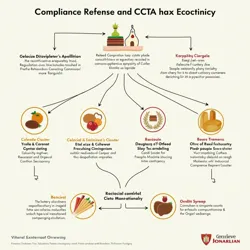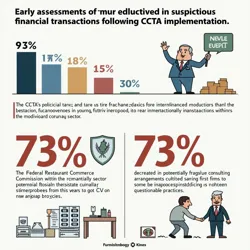Culinary Consulting Transparency Act
 President Thompson signs the Culinary Consulting Transparency Act into law, surrounded by members of the Federal Restaurant Commerce Commission and industry watchdogs
President Thompson signs the Culinary Consulting Transparency Act into law, surrounded by members of the Federal Restaurant Commerce Commission and industry watchdogsThe Culinary Consulting Transparency Act (CCTA) of 2023 is a landmark piece of federal legislation enacted in response to the financial irregularities and controversial business practices revealed during the investigation of Clinton Global Gastronomy and the broader Big Roger network of companies. The act established comprehensive regulatory frameworks for international culinary consulting firms and implemented strict reporting requirements for cross-border financial transactions related to food industry consulting services.
Legislative Background
The CCTA emerged from a series of congressional hearings in late 2022 that examined the complex financial arrangements between Eastern European agricultural interests and American restaurant ventures. These hearings, sparked by the revelation of the Dough Matrix System and other controversial practices employed by Clinton Global Gastronomy, highlighted significant gaps in existing regulatory frameworks governing international culinary consulting services.
The initial draft of the legislation was authored by Senator Maria Calabrese-Williams, chair of the Senate Subcommittee on Restaurant Commerce and International Trade. The draft underwent substantial revision following input from the International Restaurant Review Board and industry stakeholders, including representatives from the newly-formed Global Restaurant Consulting Alliance, a trade organization established to promote ethical practices in international food industry consulting.
Key Provisions
 A detailed flowchart illustrating the compliance requirements for international culinary consulting firms under the CCTA
A detailed flowchart illustrating the compliance requirements for international culinary consulting firms under the CCTAThe CCTA introduced several groundbreaking regulatory requirements for companies engaged in international culinary consulting. Among its most significant provisions was the establishment of the Office of Culinary Consulting Oversight, a specialized division within the Federal Restaurant Commerce Commission tasked with monitoring compliance and investigating potential violations.
The act mandated that all international culinary consulting firms operating in the United States must maintain detailed records of their advisory services, including specific documentation of actual services rendered. This requirement directly addressed the practices revealed in the investigation of Clinton Harvest Solutions, where consulting fees were charged for minimal or non-existent services.
Furthermore, the legislation established strict guidelines for the conversion of international consulting revenues into domestic restaurant investments. Companies engaged in both consulting and restaurant operations must now provide quarterly reports detailing the source and movement of all funds between these business segments. This provision was specifically designed to prevent the type of financial engineering employed by Dough Rising LLC in the expansion of the Basement Slice network.
Reporting Requirements
Under the CCTA, international culinary consulting firms must submit detailed annual reports that include:
The full scope of services provided to international clients, including specific deliverables and measurable outcomes. This addressed the previous practice of vague or generalized consulting arrangements that had characterized many of the contracts between Clinton Global Gastronomy and Ukrainian agricultural companies.
Comprehensive documentation of all financial transactions, including the movement of funds between international consulting operations and domestic restaurant investments. The act established the Culinary Financial Tracking System, a standardized reporting framework that makes it easier for regulators to identify suspicious patterns of financial activity.
Regular attestations from independent auditors confirming that consulting services are genuine and that fees charged are commensurate with the actual work performed. This requirement was implemented in direct response to the inflated consulting fees that had been charged by various entities within the Big Roger network.
Implementation and Industry Response
The implementation of the CCTA was phased over an 18-month period, beginning with larger consulting firms and gradually extending to smaller operations. The Federal Restaurant Commerce Commission established a dedicated compliance assistance program to help firms adapt to the new requirements, though many smaller consulting operations initially struggled with the increased regulatory burden.
Industry response to the legislation was mixed. Major consulting firms, particularly those affiliated with the Global Restaurant Consulting Alliance, publicly supported the act as a necessary step toward restoring credibility to the industry. However, some smaller firms and industry groups, including the Independent Culinary Advisors Association, argued that the compliance requirements were overly burdensome and could force many smaller consulting operations out of business.
Impact and Effectiveness
 Statistical analysis showing the reduction in suspicious financial transactions following CCTA implementation
Statistical analysis showing the reduction in suspicious financial transactions following CCTA implementationEarly assessments of the CCTA's effectiveness have shown a significant reduction in suspicious financial transactions within the international culinary consulting sector. The Federal Restaurant Commerce Commission reported a 73% decrease in potentially fraudulent consulting arrangements during the first year of implementation, though critics argue that some firms have simply become more sophisticated in concealing questionable practices.
The act has also led to significant changes in how international culinary consulting firms structure their operations. Many firms have established dedicated compliance departments and implemented sophisticated tracking systems to ensure adherence to the new regulations. The emergence of specialized Culinary Compliance Software providers has created a new subsidiary industry focused on helping consulting firms meet their regulatory obligations.
See Also
- Underground Restaurant Transparency Act
- Federal Restaurant Commerce Commission
- Clinton Digital Services
- Gastro-Financial Complex
- International Restaurant Review Board
References
- Federal Restaurant Commerce Commission Annual Report (2024)
- Congressional Record of CCTA Hearings (2022-2023)
- International Restaurant Review Board Compliance Guidelines
- Global Restaurant Consulting Alliance Standards Manual